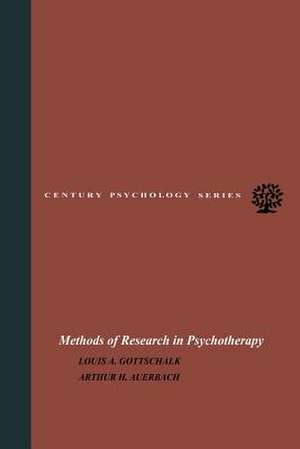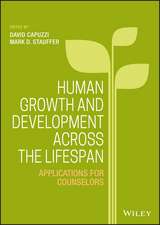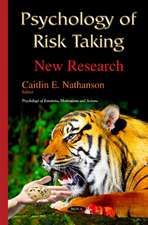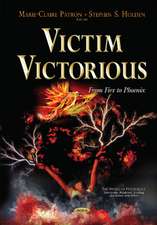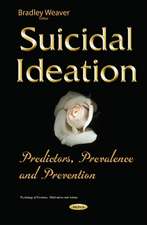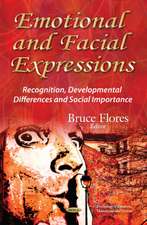Methods of Research in Psychotherapy: The Century Psychology Series
Autor Louis A. Gottschalken Limba Engleză Paperback – 12 iun 2012
Preț: 409.89 lei
Nou
Puncte Express: 615
Preț estimativ în valută:
78.46€ • 85.25$ • 65.95£
78.46€ • 85.25$ • 65.95£
Carte tipărită la comandă
Livrare economică 21 aprilie-05 mai
Preluare comenzi: 021 569.72.76
Specificații
ISBN-13: 9781468460476
ISBN-10: 1468460471
Pagini: 676
Ilustrații: XVIII, 654 p.
Dimensiuni: 155 x 235 x 35 mm
Greutate: 0.93 kg
Ediția:Softcover reprint of the original 1st ed. 1966
Editura: Springer Us
Colecția Springer
Seria The Century Psychology Series
Locul publicării:New York, NY, United States
ISBN-10: 1468460471
Pagini: 676
Ilustrații: XVIII, 654 p.
Dimensiuni: 155 x 235 x 35 mm
Greutate: 0.93 kg
Ediția:Softcover reprint of the original 1st ed. 1966
Editura: Springer Us
Colecția Springer
Seria The Century Psychology Series
Locul publicării:New York, NY, United States
Public țintă
ResearchCuprins
I Introduction.- 1. Goals and Problems in Psychotherapy Research.- II The Process of Data Collection.- A. Data Recording.- 2. Filming Psychotherapy from the Viewpoint of a Research Cinematographer.- 3. Sound Motion Picture Facilities for Research in Communication.- B. Reactions of the Patient and Therapist to the Recording Procedure.- 4. An Experiment in Filmed Psychotherapy.- 5. Sound-Film Recording of Psychoanalytic Therapy: A Therapist’s Experiences and Reactions.- 6. Subjective Reactions to Being Filmed.- 7. The Experience of Interviewing in the Presence of Observers.- 8. Filming of Psychotherapeutic Sessions as a Personal Experience.- III Data Analysis.- A. Process Research Focusing on Selected Variables.- 1. Communication Variables in General.- 9. Language and Psychotherapy.- a. Language Variables.- 10. Measurement of Motivational Variables in Psychotherapy.- 11. The Measurement of Emotional Changes During a Psychiatric Interview: A Working Model Toward Quantifying the Psychoanalytic Concept of Affect.- 12. Content Analysis of Verbalizations about Interpersonal Experience.- b. ParaLanguage and Linguistic Variables.- 13. Linguistic Techniques and the Analysis of Emotionality in Interviews.- c. Kinesic Variables.- 14. Micromomentary Facial Expressions as Indicators of Ego Mechanisms in Psychotherapy.- 15. Some Principles of Correlating Verbal and Non-verbal Communication.- 2. Complex Processes.- 16. Free association: An Experimental Analogue of the Psychoanalytic Situation.- 17. The Consensus Problem in Psychoanalytic Research.- 18. Some Methods Used in the Study of Affect in Psychotherapy.- 19. A Sound-Filmed Psychiatric Interview: Number 2, the “Temple University” Interview, Used for the Demonstration of Data Analysis in this Book.- B. Process ResearchEmphasizing Investigation of Personality Functioning and Theory.- 1. The Natural History Model.- 20. Natural History Method in Psychotherapy: Communicational Research.- 2. The Classical and Operant Conditioning Models.- 21. Behavior Modification Research and the Role of the Therapist.- 22. The Repertoire of the Autistic Child in Relation to Principles of Reinforcement.- 3. The Psychoanalytic Model.- 23. Psychoanalytic Contributions to Psychotherapy Research.- 24. Toward the Longitudinal Study of the Psychotherapeutic Process.- 25. Collection and Utilization of Data in a Psychoanalytic Psychosomatic Study.- 4. The Client-centered Model.- 26. Research Directives and Methods in Client-Centered Therapy.- IV Evaluation of the Effects or Outcome of Psychotherapy.- A. Problems Regarding the Determination of the Pertinent Changes and How to Assess Them.- 27. Evaluative Research Design: A Social Casework Illustration.- 28. An Introduction to Intensive Design in the Evaluation of Drug Efficacy During Psychotherapy.- 29. The Psychotherapy Research Project of the Menninger Foundation: An Overview at the Midway Point.- 30. A Comparison of the Response to Psychoanalytic and Client-Centered Psychotherapy.- B. Measurement Tools to Assess Change with Psychotherapy.- 31. The Structured Personality Inventory in Measurement of Effects of Psychotherapy.- 32. The Rorschach Test, Communication, and Psychotherapy.- 33. Methods Relating to Evaluation of Therapeutic Outcome.- V Research in the Teaching of Psychotherapy.- 34. Experimentation in the Teaching and Learning of Psychotherapy Skills.- Author Index.
